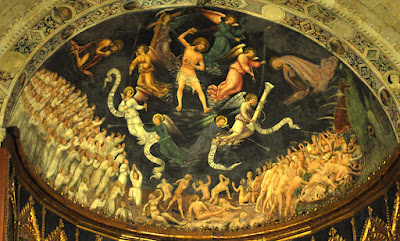Antonio Salieri was a pretty good composer; popular, too. He had a prominent and comfortable job in the Vienna court of Emperor Joseph II of Austria–Hungary, which city was a major center, even the center, of musical culture in its time. It was, as a musician might say, a good gig.
Before the theater major came to the university radio station (WLUR 91.5 FM) where I was the director of classical music programming, I had already found Salieri because he was an unknown contemporary of Mozart, and I was always looking for more obscure composers whose work I could program. How had his “good gig” settled into near-oblivion, a curiosity, a footnote?
That theater student, a senior, was preparing the thesis presentation he was to perform for the departmental jury: a selection of monologues, one of which would be a soliloquy by Salieri from Peter Schaffer’s hit play, Amadeus. He came looking for a recording of the third movement of Mozart’s Serenade for Winds, K. 361, the “Gran Partita” to use for the soundtrack. You can hear what he said about it in this clip: Click here for Salieri
That was before the hit film version of Amadeus by Milos Forman featuring Tom Hulce as Mozart and F. Murray Abraham as Salieri. That was before I was familiar with the premise of Schaffer’s play, that Salieri’s life-long gratitude to God for his musical gifts turned to anger and vengeance when he realized that he had just genius enough to recognize the true genius, Mozart, even as his own music remained popular with the undiscerning masses. On that shocking but simple awakening turns the play, the movie, and one possible understanding of an important chapter in musical and human history. The suggested subsequent effort to murder Mozart is secondary and even unimportant.
Schaffer’s penetrating insight is not unique to the particular person and situation of Salieri; if it were, I doubt the play would have had such success. There is something recognizable to everybody, I think, about Salieri’s bitterness about being just gifted enough to recognize the greater gifts of another.
It is hardly uncommon to be able to recognize what somebody else does wrong. The popular phrase, “Everybody’s a critic!” does not spring up out of a vacuum. People who have never been president even of a neighborhood committee can be very confident – and sometimes very correct – in observing the mistakes and failures of the President of the United States. That is hardly a gift, great or otherwise. Perhaps it is a gift to figure out how to make a living doing it – but I digress.
It is more rare, and more difficult, to be able to discern and describe what somebody else does well; not only very well, but exceptionally well. To be able to do that, one must know quite a bit about the work in question, and what its essential elements are, as well as its nuances. In other words, to be able to identify the elements and efforts that make someone exceptional, one has to have been pretty good himself. Perhaps this is why among all the professional sports commentators on every broadcast network, there is an effort to have at least one who has played the game at the highest level.
To see someone else doing what you yourself love to do, even live to do, and see him doing it at a level you yourself have tried and failed to achieve, can be a crushing blow. To have that experience as all around you are congratulating you on your excellence, while failing to notice the excellence of the other, would create an ironic dissonance that would be unsustainable for most of us.
Yet, most of us could understand Salieri’s dilemma in Schaffer’s depiction of it. Why is that? Perhaps, it is the shuddering realization that not only are we not as good as other people think we are, or even not as good as we wanted people to think we are, but we are not nearly as good as even we thought we were. Our gifts and abilities have raised us only to the level of being able to see where we should be, but are not. How can these abilities, then, be construed to be gifts at all?
As we close this month in which we contemplate our own end and the judgment that will come, it is healthy to recognize God has called us not to dominance, but to holiness. Comparing ourselves to others, or even to some formal measure or abstract standard, brings dissatisfaction and even misery. We should cultivate sufficient virtue in ourselves, and sufficient holiness, to be able to recognize and respect it in others, without raging when we fall short of their example.
It is no divine punishment to know what we have done badly. Our weaknesses, our mistakes, our shortcomings are transformed by the grace of God into our encounters with mercy. His mercy reveals to us the perfection of love, simultaneously making it possible for us to participate in that same perfection. Christ’s excellence does not dominate us, but rather delivers us.
God has given me eyes to see and a heart to understand; abilities and gifts, failures and faults. The time of judgment is near; the time of repentance is now. I must become a saint; my Jesus expects it! It’s better than a good gig.
Monsignor Smith



